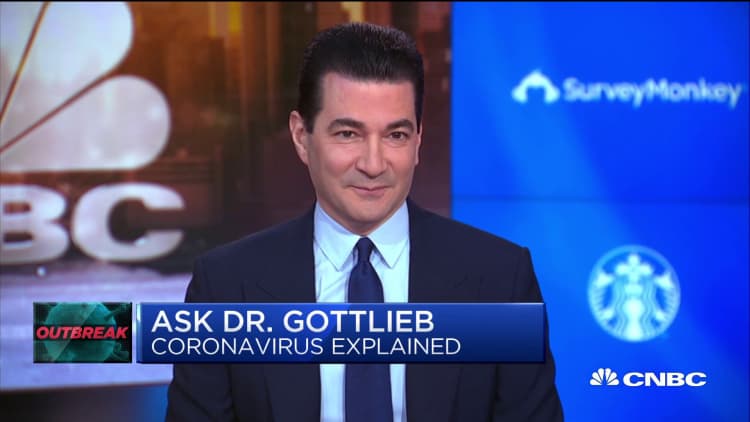Scott Gottlieb is a CNBC contributor and the former commissioner of the Food & Drug Administration. He's also a board member of Pfizer and a resident fellow at American Enterprise Institute.
Coronavirus is spreading in Hong Kong, Thailand, and Singapore. Community spread is suspected in other nations. Models suggest that for every person who traveled into the U.S. infected with coronavirus, and who was successfully diagnosed and quarantined, maybe three more arrived undetected. It was only toward the end of January that we started to even look for sick travelers.
Singapore, where community spread seems to be taking route, has about as many travelers arriving from China as the U.S. does — around 3 million a year. It's understandable that small outbreaks might become evident in that small and dense island nation of 5.7 million before they can be spotted in the U.S. But if one assumes that the virus was also imported into U.S. communities in low numbers in early January, and is now replicating, more cases could emerge.
The risk to any American remains low, but that could quickly change. It will be critical that we identify small outbreaks early, in order to prevent larger spread. There are policy steps that we can take now to reduce these viral threats, and precautions that Americans can take to lower their individual risk.
The policy steps start with broader screening to spot small outbreaks. Patients presenting with unusual cases of pneumonia, who are negative for flu and other viral illnesses, should be screened for novel coronavirus, even if they don't have a history of travel to China. Early diagnosis is key. This requires health officials to advance our posture from one currently aimed at preventing introduction of the virus into the U.S., to also focus on identifying its early spread.
Once we recognize small outbreaks, we need to be prepared to isolate sick patients. Data now suggests that a lot of early spread in China took place inside hospitals. If an outbreak occurs inside a large American city, isolation equipment and critical care facilities could be stretched. Federal health officials must be ready to backstop cities. Plans for supplemental funding of state health programs and deployment of additional medical supplies should be at the ready. In the potential setting of multiple and simultaneous outbreaks, all public health measures are local. We'll be dependent on the nation's 3,000 local health jurisdictions to prevent wider outbreaks.
There are also steps people can take to reduce their individual risk amidst the uncertainty. Your absolute risk of contracting coronavirus will remain low, even if pockets of infection start to emerge. That can change if the outbreaks widen. But good hygiene in the winter flu season is sound practice. So is getting a flu vaccine. This can reduce the chance that you could catch both infections, which can be especially dangerous, if coronavirus outbreaks do start to emerge.

Masks are of limited value for most consumers. Once a mask becomes moist its effectiveness shrinks. The type of masks most effective against aerosols, which are designed to filter out 95 percent of airborne particles, are difficult to wear for long periods of time. The best defense remains hand washing.
Most coronaviruses — which typically cause the common cold — transfer through the hands, often by touching your eyes or mouth. Good hygiene can also include use of hand sanitizer that contains between 60% to 80% ethyl alcohol. Make sure that the sanitizer dries on your hands. It's the evaporation of the alcohol that makes these products effective. Touching objects can also transfer infection. These are called viral fomites. Other coronavirus strains are known to live on dirty surfaces, probably for hours, and maybe longer in ideal settings.
Then there are handshakes. Researchers from the United Kingdom found that a "fist bump" transferred 90% fewer bacteria than a regular handshake. A high five may not fly in business settings, but it can transfer half as many germs as a handshake.
Hospitals have employed handshake-free zones in some units. Handshakes are being discouraged at next month's Mobile World Congress in Barcelona, where some high-profile companies are already dropping out due to concerns over the coronavirus. Finally, one of the most effective tools is source controls. People who have a flu or cold should limit their contact with others.
Even though the risk to Americans remains low, more cases of coronavirus will emerge in the U.S. and some community spread may ensue. We know how to control outbreaks in America. Our early warning and preparations against coronavirus could prevent a larger epidemic from taking hold. Consumers should be watchful. Simple precautions can help, even if the risk is still low.
Abigail Keller, research assistant at the American Enterprise Institute, contributed to this column.


